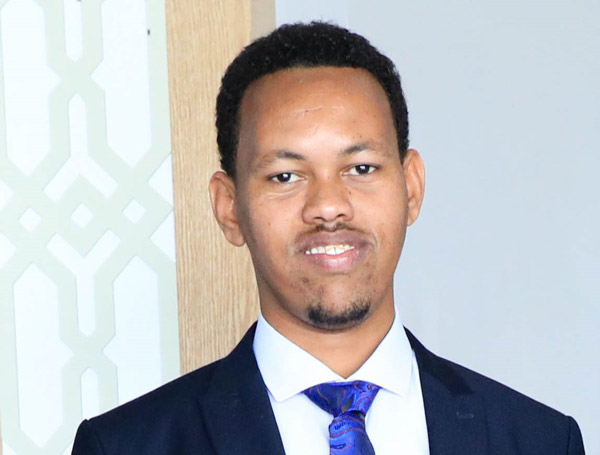Mubarik Ali
MSc International Development: Politics, Governance and Development Policy
Why did you choose to study at The University of Manchester?

I am from Somaliland, a self-declared republic in Somalia. Choosing the University of Manchester was not a difficult choice: a highly reputable academic institution, one of the highest ranked worldwide in development studies, and a range of research-informed specializations within international development on offer.
Why did you choose your particular course?
I was always infuriated by the prevailing underdevelopment, poverty and hopelessness in my country. I genuinely wanted to find working answers to satisfy my eagerness of why my community, my country and my continent remain the poorest in the world. Intrinsically, I knew that non-progressive politics and bad policies were core factors that resulted in, exacerbated, and maintained, the desperate situation that we live in. In my search for a compelling course in the development studies, I realized the Global Development Institute offers a unique course that puts politics and governance at the heart of development. The University has well established academic programmes and research projects that interrogate the discursive paradigms in the area of politics and governance. Excited, I discerned that this course was the perfect choice for my postgraduate studies and my future career.
What have you been up to since graduation?
Immediately after finishing my course at the University of Manchester, I returned to Somaliland where I started my career as a researcher with a local think tank, researching on elections and democracy in Somaliland. I then moved on to join Mercy Corps (an INGO) as a head of Somaliland office and programs coordinator, leading effective development and implementation of development and humanitarians interventions. And most recently, I joined Oxfam as a programme development specialist for the Somaliland/Somalia programme. My role entails developing quality and innovative programs that are speak to the complex and protracted situation in Somalia/Somaliland.
Has your qualification helped you in your career?
Indeed, my MSc in International Development helped me well in my career endeavours. The course equipped me with a range of transferable skills that make me a better person and a more competitive candidate: critical analysis, deep understanding of development theories and practices, qualitative research techniques and a range of social skills gained through my interactions with diverse community at the GDI.
Where then any specific modules or lecturers who particularly inspired you?
Modules linking politics, policy and governance to development were very interesting and continue to inspire my thinking and working in the field of development. In comparison with other development studies institutions, the GDI is a specialist in this area and has ongoing research projects that employ novel and interesting policy analysis tools to study development and underdevelopment in many countries. The Development Fundamentals course, core to all international development pathways at the GDI, is also a fascinating unit that maps the trajectory of development thinking, past and present, and critiques some of the fundamental issues in development studies. That module clarified some of the misconceptions and confusions I had in studying development. David Hulme, Thomas Lavers, Pablo Yanguas and Sam Hickeys were all inspiring and shaped my thinking in development. I still find it useful and thought-provoking to somewhat employ policy analysis tools – including PEA, Doing Development Differently, Thinking and Working Politically – and still find better ways to make sense of the environment I live in.
Was your degree funded by a scholarship or donor?
I was sponsored by the prestigious Chevening Scholarships, funded by the UK government. Born, raised and educated in an unrecognized, utterly poor and somewhat isolated country, I have never imagined I would be ‘good enough’ to be admitted to a postgraduate course in such a reputable and high quality university as the University of Manchester. Not least because I obtained my bachelor’s degree from an unknown institution, but more so because I had no means to finance my education at a world-class British university. With Chevening Scholarship, I was able to do just that and way more. I am a proud member of a global network of influential alumni who are leading magnificent changes in all corners of the world.
What is your best memory from your time at Manchester?
Manchester is all about it cosmopolitanism and multiculturalism! I loved, and treasure memories of, the diverse food cuisines on offer at the Curry Mile and in downtown Manchester - all within a walking distance from the University campus. I still fond the memories of the friends I made in Manchester, who we studied together, toured around the UK and had a lot fun together in our time in the UK. I still regularly keep in touch with a handful of my Manchester friends. As a Somali, Manchester was a home away from home for me as the University was only a walking distance from Moss Side, which is home to a large Somali community.
Do you have any tips or advice for current or prospective students?
To prospective students considering the GDI, I must confess you are about to join a leading and well reputed development institute that offers a range of specialist courses in international development. At the GDI, you are given every possible support to choose your field of interest within international development. From lectures and workshops, to the exciting fieldwork trips to the essays and dissertation project, you are presented with endless opportunities to shape your studies and choose your specialist area of interest.
